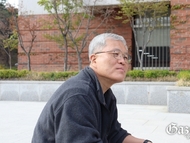 Eunuchs, the men who served a king in his palace in ancient Korea, were called naeshi in Korean. Eunuchs had various tasks: they always followed their king wherever he went, they delivered the king’s orders to other people, they checked food and drink for the king, and they did lots of palace chores such as gate keeping and housekeeping. Eunuchs remind us of women and have been described in many books and movies with the stereotyped image of a weak and small body and a high quivering voice. Some records on eunuchs can be found in other histories like the Persian Achaemenid Dynasty and the Egyptian Ptolemaic Dynasty. The main reason to have eunuchs serving kings in palaces was to keep the palaces in order because usually most women in palaces belonged to kings. These women were not allowed to have love affairs with any other men. Their affairs used to end in harsh punishment like death or exile. Kings needed to have eunuchs to control their women servants.
Eunuchs, the men who served a king in his palace in ancient Korea, were called naeshi in Korean. Eunuchs had various tasks: they always followed their king wherever he went, they delivered the king’s orders to other people, they checked food and drink for the king, and they did lots of palace chores such as gate keeping and housekeeping. Eunuchs remind us of women and have been described in many books and movies with the stereotyped image of a weak and small body and a high quivering voice. Some records on eunuchs can be found in other histories like the Persian Achaemenid Dynasty and the Egyptian Ptolemaic Dynasty. The main reason to have eunuchs serving kings in palaces was to keep the palaces in order because usually most women in palaces belonged to kings. These women were not allowed to have love affairs with any other men. Their affairs used to end in harsh punishment like death or exile. Kings needed to have eunuchs to control their women servants.Eunuchs were usually born eunuchs or made by accidents. However, as some of them were very close to their king and had power, those who wanted to be eunuchs increased and finally training centers and official national examinations for eunuchs appeared. Since the most important qualification for eunuchs was faithfulness to kings, they had to show their willingness to die for their kings by enduring severe pains in a test. Some privileged eunuchs could get married, adopt under 3-year-old eunuchs as their heirs, and have their own houses outside the palaces. It was recorded that there was a eunuchs’ village at the present Hyoza-dong in Seoul.
Most of the general information on naeshi is from the Joseon Dynasty, but naeshi in the Goryeo Dynasty before the Joseon Dynasty were an elite group who passed the state examination and participated in political activities. The naeshi of the Joseon Dynasty were called hwangwan in the Goryeo Dynasty; Goryeo people made a sharp class distinction between naeshi for high official positions and hwangwan for house chores.
Lately, TV historical dramas such as Daejanggum and Hwangjiny, are getting more interested in the stories of supporting characters than those of heroes and heroines. As there are not many historical documents or records on minor people, drama makers can make minors’ stories more dramatic by combining historical facts with fictional plots. SBS announced that a drama focusing on naeshi’s story will be televised in April of next year. Owing to the movie The King and the Clown, which was released last year and broke the box office record in Korea, many people are already expecting the drama. Now, the concealed life of ill-fated eunuchs, servants of kings, is being brought to the world and the research on them is expanding.








